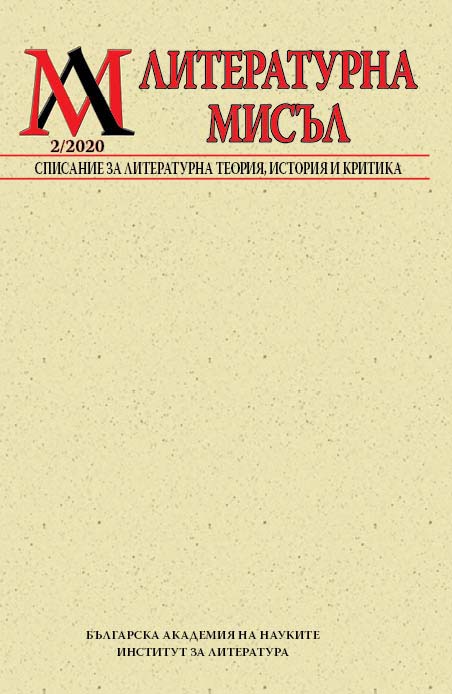„Албена“ – жанр и наративна структура
„Albena“ – genre and narrative structure
Author(s): Alexandar PanovSubject(s): Theatre, Dance, Performing Arts, Language and Literature Studies, Studies of Literature, Bulgarian Literature, Theory of Literature
Published by: Институт за литература - БАН
Keywords: Genre/Genre paradigm; Analysis; Interpretation; Narrative structure; Narrator; Autor/Reader; Plot/Fabula; Event; Short story; Novella; Casus; Value system/Value norm; Receptive strategy/Reader’s behav
Summary/Abstract: This article is based on the question why Bulgarian classic writer Yordan Yovkov’s short story „Albena“ – featured in the collection „Nights at Antym’s Inn“ – has been subject to so many different interpretations of its main concept. Does it reaffirm the strength of love, beauty, or consciousness as the main principles of being? We proceed from the assumption that its interpretation depends on the correct positioning of the text in its relative context, as well as on the adherence to the correct genre paradigm of the text and on the adequate deciphering of its narrative structure. If we position this text in an inadequate context, we will be misled to read, understand and interpret its meaning incorrectly. This is one of the main laws of literary hermeneutics. This is where the author of this article bases his main task – to analyze all elements and aspects of the story’s narrative structure that define its belonging to a particular genre paradigm. This article analyzes in detail the scheme of the plot shaping the story of „Albena“. It infers that each of its elements poses certain questions, regarding both the depicted events and the manner of their depiction. The dilemma whether the story gives answers to these questions or not, as well as the way this is done, allows the development of the plot scheme into nine distinct genre paradigms: a social novel; a psychological novel; a naturalistic novel; a criminal novel; a play depicting everyday matters; an exemplum; a ballad; a short story; and a novella. Yordan Yovkov has chosen only one of these genre paradigms. It defines the meaning and the potential for emotional effect of the story. The article analyzes the role played by the narrator, the composition and the typology of the characters and infers that the narrator has only minimal and purely technical presence in the fictional universe created in this work. In this manner the author allows his reader to perceive the entire development of the plot, with all its vicissitudes of fortune, revelations and wrongful opinions, as objective and disconnected from the author’s claim of demiurgical control. As a result, the four main humanitarian values discussed in the text – life, beauty, love and family – are allowed at least two possible interpretations, depending on the value system we use to rationalize and evaluate them. In general, these rationalizations and evaluations are made by the crowd in the story which plays the part of an ancient Greek tragic chorus, led by the coryphée Old Man Vlasyu. This technique allows us to conclude that the narrative substrate that serves as the basis of „Albena’s“ storyline is the matter whose main task is to test and reevaluate various everyday situations, as well as the validity of certain societal and moral laws that help people rationalize and evaluate them. Hence the final conclusion of the article – the genre paradigm in which „Albena“ has been developed is not the paradigm of the short story, as most analysts believe, but the paradigm of a novella. This conclusion would allow for an adequate readers’ behaviour and for a correct interpretation of the work.
Journal: Литературна мисъл
- Issue Year: 63/2020
- Issue No: 2
- Page Range: 19-48
- Page Count: 30
- Language: Bulgarian
- Content File-PDF

